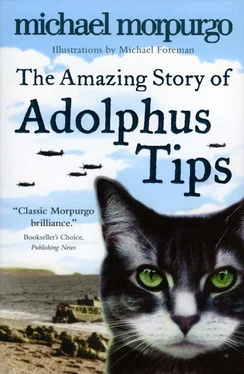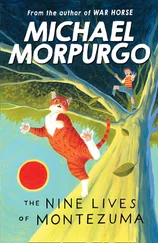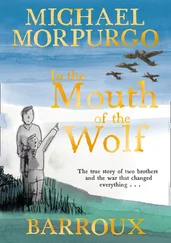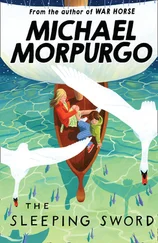When we weren’t out on Harley, we’d go on long walks down to the beach and fly kites, and on the way back we’d watch the moorhens and coots and herons on Slapton Ley. We saw a bittern once. “Isn’t that supreme?” Grandma whispered in my ear. Supreme was always her favourite word for anything she loved: for motorbikes or birds or lavender. The house always smelt of lavender. Grandma adored the smell of it, the colour of it. Her soap was always lavender, and there was a sachet in every wardrobe and chest of drawers – to keep moths away, she said.
Best of all, even better than clinging on to Grandma as we whizzed down the deep lanes on Harley, were the wild and windy days when the two of us would stomp noisily along the pebble beach of Slapton Sands, clutching on to one another so we didn’t get blown away. We could never be gone for long though, because of Grandpa. He was happy enough to be left on his own for a while, but only if there was sport on the television. So we would generally go off for our ride on Harley or on one of our walks when there was a cricket match on, or rugby. He liked rugby best. He had been good at it himself when he was younger, very good, Grandma said proudly. He’d even played for Devon from time to time – whenever he could get away from the farm, that is.
Grandma had told me a little about the busy life they’d had before I was born, up on the farm – she’d taken me up there to show me. So I knew how they’d milked a herd of sixty South Devon cows and that Grandpa had gone on working as long as he could. In the end, as his illness took hold and he couldn’t go up and down stairs any more, they’d had to sell up the farm and the animals and move into the bungalow down in Slapton village. Mostly, though, she’d want to talk about me, ask about me, and she really wanted to know, too. Maybe it was because I was her only grandson. She never seemed to judge me either. So there was nothing I didn’t tell her about my life at home or my friends or my worries. She never gave advice, she just listened.
Once, I remember, she told me that whenever I came to stay it made her feel younger. “The older I get,” she said, “the more I want to be young. That’s why I love going out on Harley. And I’m going to go on being young till I drop, no matter what.”
I understood well enough what she meant by “no matter what”. Each time I’d gone down in the last couple of years before Grandpa died she had looked more grey and weary. I would often hear my father pleading with her to have Grandpa put into a nursing home, that she couldn’t go on looking after him on her own any longer. Sometimes the pleading sounded more like bullying to me, and I wished he’d stop. Anyway, Grandma wouldn’t hear of it. She did have a nurse who came in to bath Grandpa each day now, but Grandma had to do the rest all by herself, and she was becoming exhausted. More and more of my walks along the beach were alone nowadays. We couldn’t go out on Harley at all. She couldn’t leave Grandpa even for ten minutes without him fretting, without her worrying about him. But after Grandpa was in bed we would either play Scrabble, which she would let me win sometimes, or we’d talk on late into the night – or rather I would talk and she would listen. Over the years I reckon I must have given Grandma a running commentary on just about my entire life, from the first moment I could speak, all the way through my childhood.
But now, after Grandpa’s funeral, as we walked together down the road to the pub with everyone following behind us, it was her turn to do the talking, and she was talking about herself, talking nineteen to the dozen, as she’d never talked before. Suddenly I was the listener.
The wake in the pub was crowded, and of course everyone wanted to speak to Grandma, so we didn’t get a chance to talk again that day, not alone. I was playing waiter with the tea and coffee, and plates of quiches and cakes. When we left for home that evening Grandma hugged me especially tight, and afterwards she touched my cheek as she’d always done when she was saying good night to me before she switched off the light. She wasn’t crying, not quite. She whispered to me as she held me. “Don’t you worry about me, Boowie dear,” she said. “There’s times it’s good to be on your own. I’ll go for rides on Harley – Harley will help me feel better. I’ll be fine.” So we drove away and left her with the silence of her empty house all around her.
A few weeks later she came to us for Christmas, but she seemed very distant, almost as if she were lost inside herself: there, but not there somehow. I thought she must still be grieving and I knew that was private, so I left her alone and we didn’t talk much. Yet, strangely, she didn’t seem too sad. In fact she looked serene, very calm and still, a dreamy smile on her face, as if she was happy enough to be there, just so long as she didn’t have to join in too much. I’d often find her sitting and gazing into space, remembering a Christmas with Grandpa perhaps, I thought, or maybe a Christmas down on the farm when she was growing up.
On Christmas Day itself, after lunch, she said she wanted to go for a walk. So we went off to the park, just the two of us. We were sitting watching the ducks on the pond when she told me. “I’m going away, Boowie,” she said. “It’ll be in the New Year, just for a while.”
“Where to?” I asked her.
“I’ll tell you when I get there,” she replied. “Promise. I’ll send you a letter.”
She wouldn’t tell me any more no matter how much I badgered her. We took her to the station a couple of days later and waved her off. Then there was silence. No letter, no postcard, no phone call. A week went by. A fortnight. No one else seemed to be that concerned about her, but I was. We all knew she’d gone travelling, she’d made no secret of it, although she’d told no one where she was going. But she had promised to write to me and nothing had come. Grandma never broke her promises. Never. Something had gone wrong, I was sure of it.
Then one Saturday morning I picked up the post from the front door mat. There was one for me. I recognised her handwriting at once. The envelope was quite heavy too. Everyone else was soon busy reading their own post, but I wanted to open Grandma’s envelope in private. So I ran upstairs to my room, sat on the bed and opened it. I pulled out what looked more like a manuscript than a letter, about thirty or forty pages long at least, closely typed. On the cover page she had sellotaped a black and white photograph (more brown and white really) of a small girl who looked a lot like me, smiling toothily into the camera and cradling a large black and white cat in her arms. There was a title: The Amazing Story of Adolphus Tips , with her name underneath, Lily Tregenza. Attached to the manuscript by a large multicoloured paperclip was this letter.
Dearest Boowie,
This is the only way I could think of to explain to you properly why I’ve done what I’ve done. I’ll have told you some of this already over the years, but now I want you to know the whole story. Some people will think I’m mad, perhaps most people—I don’t mind that. But you won’t think I’m mad, not when you’ve read this. You’ll understand, I know you will. That’s why I particularly wanted you to read it first. You can show it to everyone else afterwards. I’ll phone soon…when you’re over the surprise.
When I was about your age—and by the way that’s me on the front cover with Tips—I used to keep a diary. I was an only child, so I’d talk to myself in my diary. It was company for me, almost like a friend. So what you’ll be reading is the story of my life as it happened, beginning in the autumn of 1943, during the Second World War, when I was growing up on the family farm. I’ll be honest with you, I’ve done quite a lot of editing. I’ve left bits out here and there because some of it was too private or too boring or too long. I used to write pages and pages sometimes, just talking to myself, rambling on.
Читать дальше












